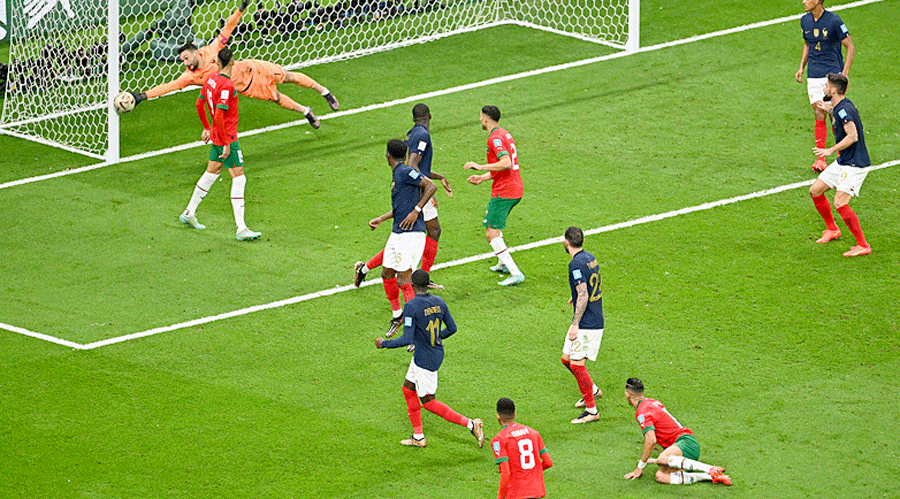Abderrazak Hamdallah makes a mazy run through the France defence, leaving Raphael Varane and Ibrahima Konate behind. It seemed Morocco would finally equalise.
The fans at the Al Bayt Stadium were on their feet, ready to celebrate, but the 31-year-old striker waits a trifle too long. It allows a chasing defence to catch up. As Hamdallah, who had some seasons ago scored 57 goals for Saudi club Al Nassr, gets ready to take the shot, France manage to close him down. Another chance goes abegging, and a distraught coach, Walid Regragui, throws his hands in despair on the sidelines.
In the early minutes of the first semi-final between Argentina and Croatia, Mateo Kovacic got the ball thrice inside the Argentina half but could not do much as the 2018 runners-up just did not have enough men upfront.
It looked all the more glaring as Mario Mandzukic, an assistant coach to Zlatko Dalic and a striker par excellence for Croatia during his playing days, watched from the dug-out.
It was evident in both the semi-finals that Croatia and Morocco were hurt by the absence of a quality striker.
“We lacked decisiveness in the last 30 metres, unfortunately. And once France scored the second goal (substitute Randal Kolo Muani in the 79th minute), that kind of extinguished our hopes,” Regragui said at the post-match news conference.
Decisiveness in front of the goal is something the two finalists have not been complaining about.
Take for example Argentina’s second and Julian Alvarez’s first goal against Croatia. Once he got a ball he did not think twice and was running straight at the Croatia goal. Despite the challenge from a couple of defenders, he managed to keep his balance and was airborne when he poked home past goalkeeper Dominik Livakovic.
Decisiveness, as well as perseverance, was on full display from the 22-year-old striker.
And during the second goal, Alvarez was at the right place at the right moment to convert Lionel Messi’s out-ofthe-world assist. A quintessential striker’s goal.
France have an abundance of talent upfront but Olivier Giroud’s performance in this World Cup has been the most eye-catching. He was not expected to get a start had Karim Benzema not found himself ruled out of the tournament with an injury. But once it was clear that Giroud will be the man Didier Deschamps will rely on for the goals, the 36-year-old did not let his team and coach down.
It’s not just Croatia or Morocco — both failed to score in the semi-finals — who bemoan lack of strikers, even teams like Germany, Spain and Brazil have struggled because of that.
Brazil have Richarlison who will deliver the goals, but against a quality and compact team like Croatia, the Tottenham Hotspur striker failed to turn up.
Germany had the maximum attempts at goal in the group-stage but that was not good enough to see them through to the knockout round. Spain, despite all their fluid passing game, have struggled because of a striker in the mould of a Fernando Torres or a David Villa.
“Morocco played really well through midfield and Hakim Ziyech was very influential but as soon as they got really close to the box, they were lacking the finishing and the vision to get things done. I think African and Asian teams in general need to find a solution — Senegal would have been a different proposition had Sadio Mane been fit. If you look at the big African nations, if they had a true No. 9 (striker), they could damage any nation from Europe or South America,” Jürgen Klinsmann, a World Cup winner in 1990 and a former Germany coach, wrote in his BBC newsletter.
Dalic or Regragui will not disagree with Klinsmann.











